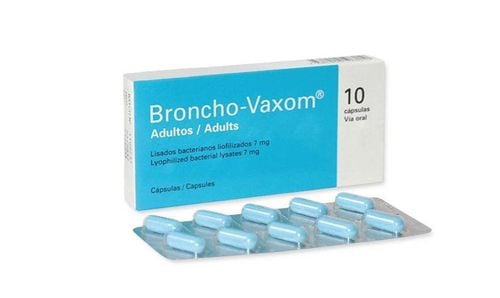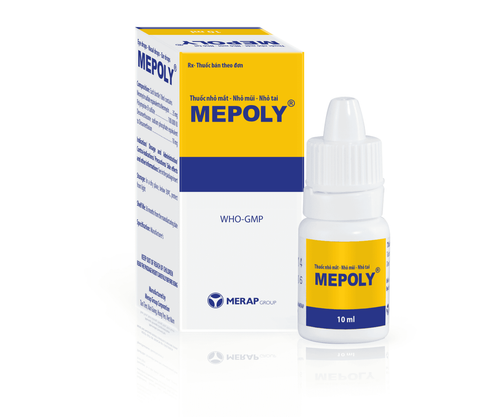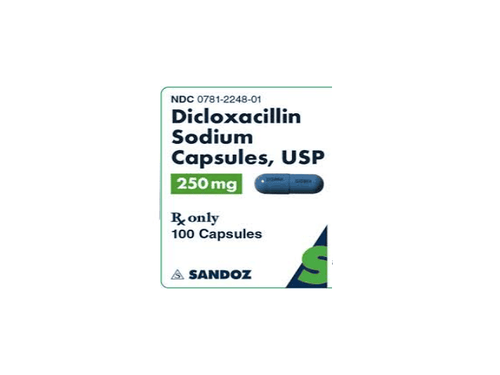This is an automatically translated article.
Dianflox Tab contains the active ingredient Levofloxacin indicated in the treatment of infections caused by susceptible bacteria such as sinusitis, exacerbation of chronic bronchitis, pneumonia, skin and structural infections... Learn about dosage, notes when using Dianflox tab through the article below.1. Uses of the drug Dianflox tab
Dianflox tab contains the active ingredient Levofloxacin, which is made in the form of film-coated tablets. Levofloxacin is an antibacterial antibiotic belonging to the Quinolone group, acting by inhibiting enzymes in the process of DNA synthesis, Topoisomerase IV and Topoisomerase II, making bacterial DNA replication, translation and transcription impossible. that can kill bacteria.
Dianflox tab is indicated in the following cases:
Respiratory tract infections such as acute sinusitis, pneumonia, acute exacerbation of chronic bronchitis...; Skin and soft tissue infections; Urinary tract infections with or without complications; Nephritis - acute pyelonephritis; The use of Dianflox tab is contraindicated in the following cases:
Patients with hypersensitivity to Levofloxacin, Quinolone antibiotics or any component of Dianflox tab; Patients with G6PD deficiency, epilepsy; People with a history of tendon disease caused by a fluoroquinolone antibiotic; Children under 18.
2. Dosage of the drug Dianflox tab
Dianflox tab is used to treat infections with the dose prescribed by the treating doctor. The patient absolutely does not self-medicate. Overdosing on recommended drugs, shortening or prolonging the duration of treatment can increase the risk of drug resistance.
Some recommendations on the dose of Dianflox tab are as follows:
Treatment of acute sinusitis: Take 500mg/day for 10-14 days; Treatment of acute exacerbations of chronic bronchitis: Take 250-500mg/day for 7-10 days, take 1 time or divided into 2 oral doses; Treatment of community-acquired pneumonia: Take 500mg/day for 7-14 days, take 1 time or divided into 2 doses a day; Treatment of complicated urinary tract infections, nephritis - pyelonephritis: Take 250mg/day for 7-10 days; Treatment of skin - soft tissue infections: Take 50mg/day divided into 1-2 times a day, treatment time from 7-14 days; For patients with renal impairment, the dose should be reduced according to creatinine clearance; for patients with hepatic impairment, no dose adjustment is required.
3. Dianflox tab drug side effects
Dianflox tab can cause some side effects as follows:
Common: Increased liver enzymes, nausea, diarrhea, insomnia, headache; Uncommon: Nervousness, dizziness, anxiety, agitation, dyspepsia, flatulence, vomiting, constipation, hyperbilirubinemia, vaginitis, genital candidiasis, skin rash, skin pruritus; Rare: Arrhythmia, hypertension or hypotension, dry mouth, pseudomembranous colitis, gastritis, tongue edema, muscle weakness, arthralgia, osteomyelitis, Achilles tendonitis, abnormal dreams, convulsions, psychosis, depression, anaphylaxis, Quinck's edema, Stevens-Johnson syndrome. In case of experiencing any symptoms of side effects, the patient should stop using Dianflox tab and notify the treating doctor for treatment.
4. Notes when using Dianflox tab
Tendonitis: Levofloxacin in particular and Quinolone antibiotics in general can cause tendonitis (especially the Achilles tendon) and may lead to tendon rupture. This complication usually occurs after 48 hours of taking the drug, the risk is high in people over 65 years old, the patient is being treated with corticosteroids. Effects on the musculoskeletal system: Dianflox tab can cause cartilage degeneration of gravity-bearing joints when tested on young animals, so it is contraindicated to use the drug in children under 18 years of age. Risk of myasthenia gravis: Dianflox should be used with caution in patients with myasthenia gravis because the drug worsens the symptoms. Central nervous system effects: There have been reports of adverse reactions during treatment with Dianflox tab such as increased intracranial pressure, psychosis, confusion, depression, nightmares, hallucinations, Suicidal thoughts or actions... Therefore, Dianflox should be used with caution in patients with central nervous system diseases such as cerebral sclerosis, epilepsy... Hypersensitivity reactions: There have been reports There have been reports of hypersensitivity reactions with various clinical symptoms, even anaphylaxis... Clostridium difficile pseudomembranous colitis can range from mild to life-threatening during treatment with Clostridium difficile. Levofloxacin in particular and antibiotics in general. Photosensitivity has been reported with mild to moderate severity during treatment with quinolones. Therefore, patients should avoid exposure to light during treatment with Dianflox and for 48 hours after stopping the drug. Effects on metabolism: Dianflox may cause adverse effects on glucose metabolism, such as hyperglycemia or hypoglycemia, which may occur in diabetic patients being treated with Levofloxacin in combination with a hypoglycemic agent. blood. Therefore, patients should be carefully monitored in these cases. Prolong QT interval on electrocardiogram: Dianflox tab may prolong the QT interval on electrocardiogram in some patients, so its use should be limited in patients with hypokalemia, patients with prolonged QT interval. For a long time, the patient is being treated with class IA, class III antiarrhythmic drugs...
5. Drug interactions
Sucrafat, Antacid, metal ion, Multivitamin... reduce absorption of Levofloxacin. Therefore, Levofloxacin should be taken at least 2 hours apart from these drugs. Concomitant use of Dianflox tab and warfarin increases the effect of warfarin, so it is necessary to monitor blood clotting indicators when these two drugs are used concomitantly. Non-steroidal anti-inflammatory drugs increase the risk of CNS stimulation, increase the risk of convulsions when used concomitantly with Dianflox tab. Concomitant use of Dianflox tab with antidiabetic drugs increases the risk of dysglycemia. Drug interactions occur that reduce the therapeutic effect of Dianflox, increasing the risk of experiencing unwanted effects. Therefore, the patient needs to inform the doctor about the drugs and supplements being used (vitamins, minerals...) before being treated with Dianflox to ensure safety and effectiveness.
Please dial HOTLINE for more information or register for an appointment HERE. Download MyVinmec app to make appointments faster and to manage your bookings easily.













